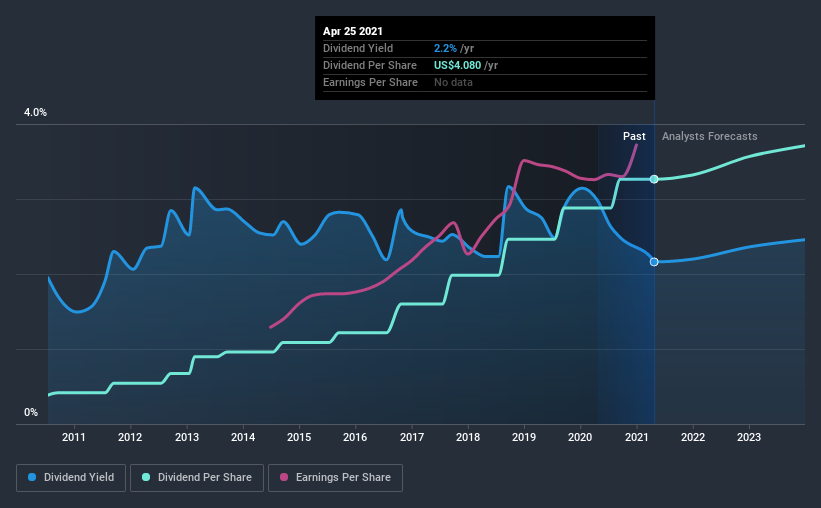Three Days Left To Buy Texas Instruments Incorporated (NASDAQ:TXN) Before The Ex-Dividend Date
Readers hoping to buy Texas Instruments Incorporated (NASDAQ:TXN) for its dividend will need to make their move shortly, as the stock is about to trade ex-dividend. Investors can purchase shares before the 30th of April in order to be eligible for this dividend, which will be paid on the 17th of May.
Texas Instruments's upcoming dividend is US$1.02 a share, following on from the last 12 months, when the company distributed a total of US$4.08 per share to shareholders. Calculating the last year's worth of payments shows that Texas Instruments has a trailing yield of 2.2% on the current share price of $188.82. If you buy this business for its dividend, you should have an idea of whether Texas Instruments's dividend is reliable and sustainable. We need to see whether the dividend is covered by earnings and if it's growing.
Check out our latest analysis for Texas Instruments
If a company pays out more in dividends than it earned, then the dividend might become unsustainable - hardly an ideal situation. Texas Instruments paid out 62% of its earnings to investors last year, a normal payout level for most businesses. Yet cash flows are even more important than profits for assessing a dividend, so we need to see if the company generated enough cash to pay its distribution. Dividends consumed 62% of the company's free cash flow last year, which is within a normal range for most dividend-paying organisations.
It's encouraging to see that the dividend is covered by both profit and cash flow. This generally suggests the dividend is sustainable, as long as earnings don't drop precipitously.
Click here to see the company's payout ratio, plus analyst estimates of its future dividends.
Have Earnings And Dividends Been Growing?
Companies with consistently growing earnings per share generally make the best dividend stocks, as they usually find it easier to grow dividends per share. Investors love dividends, so if earnings fall and the dividend is reduced, expect a stock to be sold off heavily at the same time. For this reason, we're glad to see Texas Instruments's earnings per share have risen 16% per annum over the last five years. Texas Instruments has an average payout ratio which suggests a balance between growing earnings and rewarding shareholders. Given the quick rate of earnings per share growth and current level of payout, there may be a chance of further dividend increases in the future.
The main way most investors will assess a company's dividend prospects is by checking the historical rate of dividend growth. Since the start of our data, 10 years ago, Texas Instruments has lifted its dividend by approximately 24% a year on average. It's exciting to see that both earnings and dividends per share have grown rapidly over the past few years.
The Bottom Line
Should investors buy Texas Instruments for the upcoming dividend? Higher earnings per share generally lead to higher dividends from dividend-paying stocks over the long run. That's why we're glad to see Texas Instruments's earnings per share growing, although as we saw, the company is paying out more than half of its earnings and cashflow - 62% and 62% respectively. Overall, it's not a bad combination, but we feel that there are likely more attractive dividend prospects out there.
In light of that, while Texas Instruments has an appealing dividend, it's worth knowing the risks involved with this stock. Case in point: We've spotted 2 warning signs for Texas Instruments you should be aware of.
If you're in the market for dividend stocks, we recommend checking our list of top dividend stocks with a greater than 2% yield and an upcoming dividend.
This article by Simply Wall St is general in nature. It does not constitute a recommendation to buy or sell any stock, and does not take account of your objectives, or your financial situation. We aim to bring you long-term focused analysis driven by fundamental data. Note that our analysis may not factor in the latest price-sensitive company announcements or qualitative material. Simply Wall St has no position in any stocks mentioned.
Have feedback on this article? Concerned about the content? Get in touch with us directly. Alternatively, email editorial-team (at) simplywallst.com.

 Yahoo Finance
Yahoo Finance 
